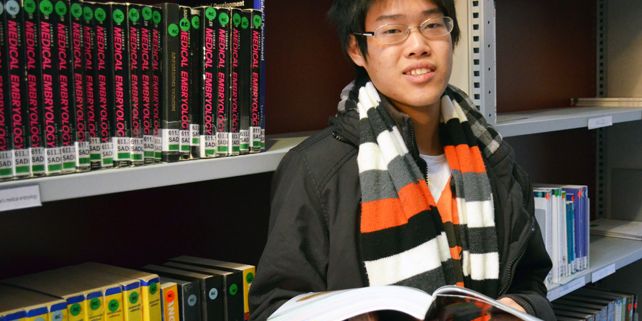While Rangsimun Low was considering where to go to study medicine, he had the good fortune to cross paths with a professor from the Czech Republic. At that time Rangsimun had no idea where the Czech Republic was or what it was like there. In the end he was given six years to find this out; six years is the length of a course of study at the Faculty of Medicine at Masaryk University in Brno.
In the Czech Republic by chance
“I was on holiday in Kuala Lumpur and there was an educational exhibition taking place there. I saw a presentation about a university in Prague given by a professor from the Czech Republic,” explains twenty-year-old Rangsimun, who is known to all his friends as Lester.
“One of things that attracted me to Prague was the mention that it was no problem to use English in communication there. So I decided to try the Czech Republic, even though I didn’t know exactly where it was,” says Lester, who didn’t get the chance to study medicine in his home country. In Thailand medical schools receive one million applicants for every 100,000 places.
On his arrival in Prague his first impressions differed greatly from the presentation. “Is THIS really Prague?” Lester asked himself after he had tried and failed to get advice in English. Lester can laugh about it now. “That was when I realized that English doesn’t work particularly well with local people here.”
Lester´s plan to learn Czech and apply for a scholarship failed: he found the grammatical structures of the Czech language more and more difficult to understand. “After taking a Czech language course for half a year, I just had to give it up. The Czech language is just too difficult”, confesses Lester. In the end, he decided to study the same degree but in English at Masaryk University: study support and conditions and technical support were the best here.
The challenge of Latin
Lester has dreamt of becoming a doctor since he was a child. He would watch the work of doctors at a local hospital with curiosity. He was aware that the journey to become one of them was not easy. No matter how difficult it might be to study medicine, especially in a foreign environment, Lester really likes it. It took time and energy to adjust to the system at a Czech medical school – the same subjects are taught in Thailand in a different way. “In my home country, in examinations the teachers present us with a medical problem and we are supposed to find and describe the most effective way of solving it,” Lester explains. In Brno the focus is on theory rather than problem-solving. “We have to memorize everything – and that is the priority,” he says.
Besides studying quantum theory by heart, the first examination period has presented Lester with the necessity to conquer chapters of a Latin coursebook. “There is an unequal struggle between me and the Latin language, but so far I am able win it,” jokes Lester. If he had studied medicine in Thailand, he would never have had to deal with Latin because medical terms are used in English there.
Despite being the only Asian at the Faculty of Medicine, Lester has been able to make new friends quickly. In his study group there are future doctors from various parts of the world. The best relationship there is between Lester and his Portuguese friends. “I’ve learned that Portuguese people are very friendly and open-minded. That’s why I love spending time with them,” he says.
Trouble with the foreign police
As a foreigner from a country outside the European Union, Lester is obliged to have a valid residence permit. Visits to the foreign police are, unfortunately, a must in his case. And Lester’s experience of these is not good.
Besides the language barrier (he is never able to find anyone there to communicate in English with), Lester tends to be given the residence permit for two months only – even though the maximum is actually one full year. Lester summarizes his experience of Czech bureaucracy thus: “If they do not like you, they just give you the permit for a short period. From my point of view, for them it is just about money. With each application, I have to pay 100 Euros.”
Author of this article is a student at the Faculty of Social Studies, Masaryk University.
